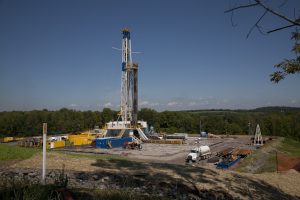Front Porch Blog

In the face of widespread public opposition and demand for stronger rules, fracking permits can officially be applied for in North Carolina. Photo by Bob Warhover
March 17 marked the first day in history that North Carolina has been fully open to the oil and gas industry for the dangerous, environmentally destructive practice of hydraulic fracturing for natural gas.
Despite widespread public opposition, Governor McCrory and state legislators rushed to open the state to drilling, ignoring hundreds of North Carolinians who spoke at public hearings across the state and thousands more that sent written comments requesting stronger rules.
Despite legislators’ promises that the rules would be the strongest in the country, the final package leaves much to be desired. The rules lack any provisions to control air pollution and they do not clarify legal confusion about forced pooling, the controversial process by which landowners are pooled into a drilling unit without their consent.
Adding insult to injury, on March 18, the North Carolina legislature passed its first bill since the session began in January, which declares that it is optional for the state Environmental Management Commission to create rules regulating air emissions from fracking operations. Previously, the Energy Modernization Act, which paved the way for fracking in the state, required that the EMC develop regulations to protect communities from air pollution.
North Carolina has very small shale deposits and it is unclear where they are located and how much they will actually produce. What is known is that the shale deposits in North Carolina are closer to groundwater sources than the shale deposits in other states that have already experienced groundwater contamination from failed fracking well cases. Additionally, there are no facilities in North Carolina that can treat the toxic wastewater produced by drilling and there are currently no pipelines to transport the fracked gas.
Combine North Carolina’s weak rules, unclear picture of gas reserves, and a lack of infrastructure to transport what little gas the state can produce, with dropping gas prices and drilling companies operating in the red, and you can be sure that the only drillers North Carolina is likely to attract are wildcatters.
When multi-billion dollar oil and gas companies can’t even drill safely, it seems unlikely that small-time prospectors will take every precaution to protect groundwater and neighboring communities from harm.
Though the moratorium on fracking has been lifted, communities and environmental organizations across the state are prepared to continue fighting. We’ll be watching the Department of Energy Mineral and Land Resources closely for any applications to create a drilling unit or for a drilling permit. If a permit is applied for, we’ll be ready to fight it.
Learn more about the risks of fracking and stay up to date by signing up for “Frack Updates” from Frack Free N.C.
PREVIOUS
NEXT
Related News

Leave a comment
Your email address will not be published. Required fields are marked *

Leave a Comment